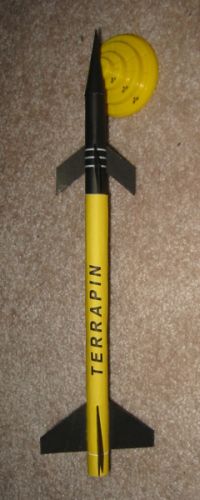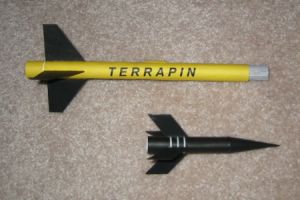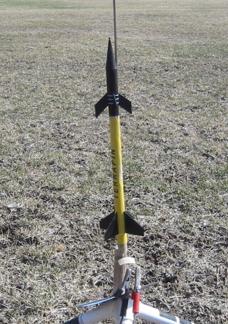Scratch Terrapin Original Design / Scratch Built
Scratch - Terrapin {Scratch}
Contributed by Clive Davis
| Manufacturer: | Scratch |

Brief:
This is a paper model of the University of Maryland Terrapin research rocket.
It can actually be configured to fly as a two-stage design, but I have only
flown it as a single stage. I designed the rocket using various sources on the
Terrapin. I would say it is more sport scale than scale. Scale is 1:15.5.
Construction:
The plans are all printed on one 8.5 x 11" sheet of cardstock. Also
necessary to build the kit are:
- glue
- shock cord and streamer
- clay for nose weight
- a black Sharpie magic marker
After printing up the plans on a sheet of cardstock, I carefully cut out all the parts. This basically consists of 8 fins, two body tubes, a nose cone, a shoulder, a launch lug, and two tri-fold shock cord attachments.
Next, I used a dowel to help roll the body tubes and used yellow glue to glue them into cylindrical tubes. Then I rolled the nose cone. Once the nose cone has dried, there are tabs on the top of the upper body tube that are used to attach the nose cone to the black upper body tube. I rolled the shoulder and test fit it into both the bottom of the black body tube and top of the yellow body tube. Once I was sure that the shoulder fits both lower and upper body tube, I glued it into the top of the yellow body tube. I set this aside to dry.
I folded and rolled the engine block and then used an empty 13mm motor mount to glue the engine mount into the bottom of the yellow body tube. I just made sure the motor stuck out the back of the rocket by about 1/4".
I used an empty ball point pen and a ruler to run a crease along the fins so that they can fold easily. Once this was complete, I put glue in the fins and folded them over so that they were now double sided. I placed them on a flat surface, covered them with wax paper, and then placed a few heavy books on top. After they dried, I removed them. I then glued the small swept back fins on the upper body tube using the gray lines as a guide. Since the fins are so thin, it is a good idea to use white or yellow glue to add some fillets on either side of the fins. I also glued on the lower clipped delta fins on the lower yellow body tube.
 I rolled the
launch lug around a launch rod and then glued it in shape. After this was dry,
I glued it half way up the yellow body tube between two fins on the model.
I rolled the
launch lug around a launch rod and then glued it in shape. After this was dry,
I glued it half way up the yellow body tube between two fins on the model.
The recovery system is simple. I just placed a shock cord with the tri-fold shock cord attachment (one on either end of cord) in the rocket, one inside the top of the yellow body tube and the other inside the bottom of the black body tube. I then filled the nose cone with clay and then covered the clay with a good portion of yellow glue. After everything was dry, I added a streamer to the shock cord.
Finishing:
The only thing I did was use a black magic marker to cover up the white portion
on the fins and nose cone from the paper ends and folds.
Since the paper rocket is already finished with colors, all I did was use a clear coat to seal the ink from the ink jet printer. Currently, I am using watered down Mod Podge to get a nice finish on my paper models. Not only does this cover the ink, but it also strengthens the paper.
Flight:
I have flown this rocket three times. The first time I used an A3-4T in a model
that had nose weight. This really zipped off the pad. I never saw the ejection
and never saw the recovery. It is probably sitting in a bunch of trees. The
next launch was on an A10-3T. I had done a RockSim calculation which indicated
that no nose weight was necessary. I was curious to say the least and gave it a
try on another model I brought to the field, but this one was without any clay.
The rocket cleared the pad and was about 20 to 30 feet in the air when
everything went crazy. It started sky writing and it lost three fins. The
rocket landed not far from the pad. I collected two fins but could not find the
third. I then had to take the Terrapin home for repairs before I could fly it
again.
 On the third flight,
I used nose weight again and selected an A3-4T. It zipped off the pad, had
great altitude, and I was able to watch the recovery all the way down.
Beautiful flight with nice recovery. Next up, I need to try a 1/2A3-4T.
On the third flight,
I used nose weight again and selected an A3-4T. It zipped off the pad, had
great altitude, and I was able to watch the recovery all the way down.
Beautiful flight with nice recovery. Next up, I need to try a 1/2A3-4T.
The only CONs I see in this design is the fact that the fins are very thin and they must be glued well onto the body tubes. They do have a tendency to bend, which doesn't necessarily make the flights unsafe, but it does contribute to some squirreliness in the flight, particularly in the coast phase. Just make sure the fins are on straight.
Recovery:
I have noticed some browning of the yellow body tube from the ejection charge.
If a person really wanted to avoid this, they could put little aluminum foil
tubes inside the lower body tube to protect it from unusually large Estes
ejection charges.
Since there is weight in the nose cone, this tends to come down first. I would probably seal the nose cone with CA glue internally first before adding any clay so that it is more robust on landings. Other than that, the Terrapin held up well to flight and recovery.
Summary:
PROs: The Terrapin is a beautiful rocket with great lines. No one makes a kit
of this. It is unusual and with this paper rocket, it is pretty cost effective
to make a cheap flying version of this historic object. This rocket can also be
converted into a two stage rocket. I would recommend the following:
- Use the shoulder to glue into the nose cone.
- Put shock cord in 2nd stage rocket and nose cone. Nose cone should not be glued in for obvious reasons.
- Create a second engine block for second stage
- Use the sustainer motor as the coupler between the first and second stage, thus replacing the shoulder in the "one-stage" version.
- Create two vent holes in the yellow stage so that the hot particles actually reach the sustainer motor. Otherwise, the upper stage would simply blow off before the motor had a chance to ignite.
- Find a good source of A10-0T motors. They are out of production now, so they are getting hard to find.
- Launch the rocket with a few people to help track the flight. Considering how small the upper stage is, you will probably have a hard time locating it after recovery.
CONs: Fin attachment needs to be done well. Ejection charges may discolor and eventually burn through paper model.
 |
 |